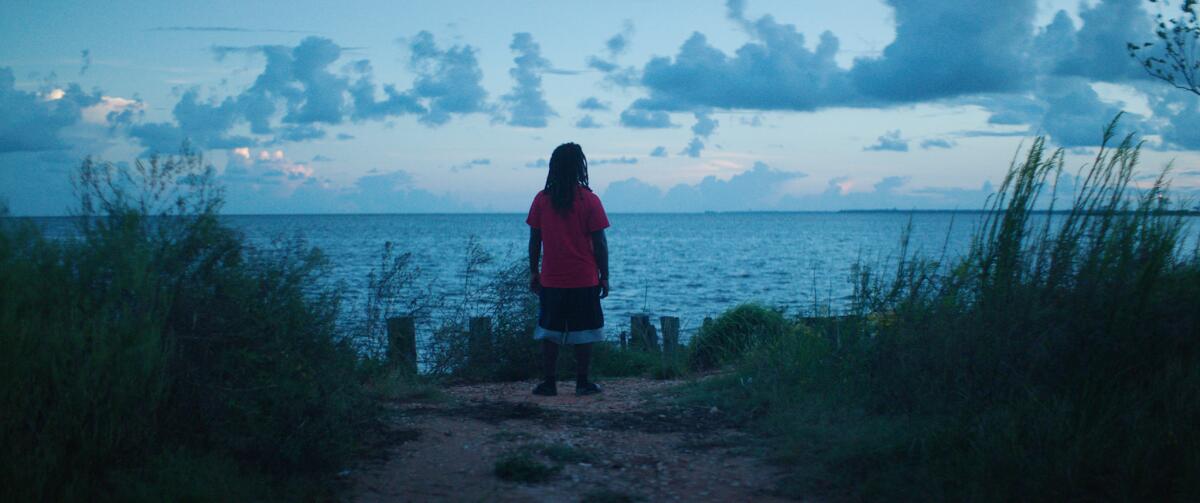How passed-down memories become full American history in ‘Descendant’

- Share via
It was one of the most shameful episodes in American history. In 1860, wealthy businessman and human trafficker Timothy Meaher wagered that he could illegally smuggle a ship with 110 enslaved Africans — illegal at the time — into Mobile, Ala. And so he did. Then the ship, christened the Clotilda, was set on fire. The ruins sank to the bottom of the Mobile River, where they were discovered in 2019 after more than a century of speculation. The electrifying moment confirmed for the residents of the city’s Africatown, populated by descendants of the Clotilda’s survivors, what they’d known for generations — and shared as oral history, even under threats of lynching.
“Descendant,” which won a special jury prize for creative vision at the Sundance Film Festival and launched in October on Netflix, recounts the cruel saga of this last-known American slave vessel. The film also, with poignancy and patience, explores its contemporary effect on the citizens of Africatown, a proud and historic community encircled by heavy industrial sites that have long degraded the enclave’s quality of life.
Filmmaker Margaret Brown, a Mobile native, was raised as what she calls “upper middle class, for Alabama.” She heard little about the Clotilda as she grew up. “It was the kind of thing that people didn’t talk about, like white people didn’t talk about,” she said. “It was more like a myth whispered about.” For Brown, the reason why was pretty clear. “It was wealthy white landowners [who] got to write the history,” she said. “You start to question, well, what is valid history? What gets suppressed? It starts to be kind of mind-blowing, really.”
Brown’s 2008 film “The Order of Myths” touched on this history, as she explored the foundational matter of race and division in Mobile, chronicling the port city’s parallel Mardi Gras traditions: one white, one Black. The film’s revelation is that both of the film’s Mardi Gras queens, Helen Meaher and Steffanie Lucas, had ties to the Clotilda. One as a member of the Meaher family, the other as a descendant of Africans who were snatched to take to Mobile on the ship.
The Clotilda’s discovery sparked an even more profound excursion, backward and forward in time, as Brown returned home to hear what the residents of Africatown had to say. Amid silence from the Meahers, Brown was drawn powerfully to the community.
“When you pass down a story for 160 years, you become a very good storyteller,” Brown said. “What struck me right away was that this is a community of storytellers and very good storytellers.”
Among a compelling array of subjects is Emmett Lewis, a descendant of Cudjoe Lewis, a long-lived survivor of the Clotilda, who died in 1935 and whose late 1920s interviews with filmmaker and anthropologist Zora Neale Hurston became the source for her book “Barracoon: The Story of the Last ‘Black Cargo,’” whose long-delayed 2018 publication aroused new interest in the Clotilda. Brown features excerpts and also includes film footage that Hurston shot in Africatown. “I became very enamored of her voice and also her cinematography, her skills as a storyteller on all different fronts,” the director said. “ She was kind of a spiritual guide.”
Brown also enlisted Kern Jackson, a folklorist who is director of the African American Studies Program at the University of South Alabama, and with whom she first worked on “The Order of Myths,” as a co-writer and co-producer — and onscreen presence. Jackson praised the spirit of collaboration that the filmmaker encouraged. “I think it has to do with being of this place and space,” he said. “She knows the cultural pathway.”
One notable aspect of the approach, he said, was giving the numerous descendants whose stories are told room to breathe on camera, using silence to invite contemplation. “I thought that was just so beautiful, to let the informant land where they want to land and give the camera some space for us to see the landing, not just roll on to the next topic or thematic thing or whatever.”
In its attentive weaving of overlapping stories, time frames and personas, “Descendant” offers complex perspectives on matters that are not secured in the historical past but shadow everyday life in Africatown. As long-buried secrets come to light, they bring with them new burdens.
“There was initial excitement because it was big news,” said Veda Tunstall, one of the film’s most vocal subjects. “As time went on, it kind of settled down and got to ‘what do we do now?’”
The film touches on much of the discussion around reconciliation, reparations and efforts toward capitalizing on the discovery to improve life in the neighborhood. Members of the Meaher family in October signaled a willingness to talk with community activists and in a statement sent to NBC News denounced their forebear’s actions as “evil and unforgivable.”
Tunstall is hopeful that a surge of public awareness inspired by the film’s wide exposure will do some good.
“People are like, ‘Wow, I had no idea. I didn’t know that was over there.’ So now people are … looking at the things that they saw in the movie. ‘Oh, I get it now, I see it. I didn’t know what I was looking at before,’” she said. “The other thing is that we as descendants and community members and activists are really organizing … to make sure that something comes of this.”
More to Read
Sign up for The Envelope
Get exclusive awards season news, in-depth interviews and columnist Glenn Whipp’s must-read analysis straight to your inbox.
You may occasionally receive promotional content from the Los Angeles Times.








